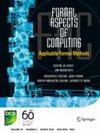论概率终止的词典证明规则
IF 1.4
4区 计算机科学
Q3 COMPUTER SCIENCE, SOFTWARE ENGINEERING
引用次数: 7
摘要
考虑概率规划的几乎确定终止问题,它是经典命令式规划的一种随机扩展。字典排序函数为非概率程序的终止提供了一种可靠而实用的方法,并通过字典排序上鞅(LexRSMs)实现了它们对概率程序的扩展。然而,在前面的工作中引入的lexrsm有一个限制,阻碍了它们的自动化:它们的所有组件在所有可达状态下都必须是非负的。这可能导致即使对于简单的终止程序也不存在LexRSM。我们的贡献是双重的。首先,我们介绍了lexrsm的一般化,它允许某些组件为负。这种非概率终止证明的标准特征迄今为止还不知道在概率设置中是可靠的,因为可靠性证明需要对潜在的随机过程进行仔细的分析。其次,我们提出了多项式时间算法,使用我们的广义LexRSMs来证明广义线性算术程序中的自动终止。本文章由计算机程序翻译,如有差异,请以英文原文为准。
On Lexicographic Proof Rules for Probabilistic Termination
We consider the almost-sure (a.s.) termination problem for probabilistic programs, which are a stochastic extension of classical imperative programs. Lexicographic ranking functions provide a sound and practical approach for termination of non-probabilistic programs, and their extension to probabilistic programs is achieved via lexicographic ranking supermartingales (LexRSMs). However, LexRSMs introduced in the previous work have a limitation that impedes their automation: all of their components have to be non-negative in all reachable states. This might result in a LexRSM not existing even for simple terminating programs. Our contributions are twofold. First, we introduce a generalization of LexRSMs that allows for some components to be negative. This standard feature of non-probabilistic termination proofs was hitherto not known to be sound in the probabilistic setting, as the soundness proof requires a careful analysis of the underlying stochastic process. Second, we present polynomial-time algorithms using our generalized LexRSMs for proving a.s. termination in broad classes of linear-arithmetic programs.
求助全文
通过发布文献求助,成功后即可免费获取论文全文。
去求助
来源期刊

Formal Aspects of Computing
工程技术-计算机:软件工程
CiteScore
3.30
自引率
0.00%
发文量
17
审稿时长
>12 weeks
期刊介绍:
This journal aims to publish contributions at the junction of theory and practice. The objective is to disseminate applicable research. Thus new theoretical contributions are welcome where they are motivated by potential application; applications of existing formalisms are of interest if they show something novel about the approach or application.
In particular, the scope of Formal Aspects of Computing includes:
well-founded notations for the description of systems;
verifiable design methods;
elucidation of fundamental computational concepts;
approaches to fault-tolerant design;
theorem-proving support;
state-exploration tools;
formal underpinning of widely used notations and methods;
formal approaches to requirements analysis.
 求助内容:
求助内容: 应助结果提醒方式:
应助结果提醒方式:


